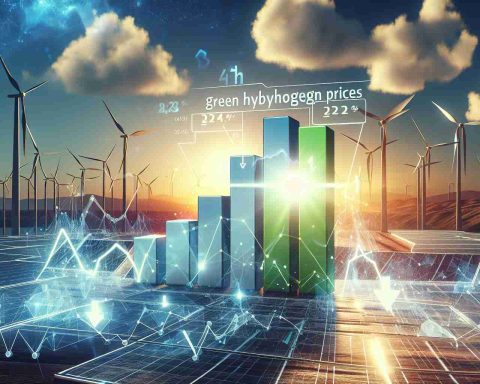- Novelis Inc. has innovatively powered a recycling furnace with hydrogen at its Latchford, Warrington, UK plant, pioneering a path toward sustainability in aluminium production.
- This initiative is part of a UK government decarbonization effort, significantly reducing emissions by up to 90% with hydrogen fuel as a cleaner alternative to natural gas.
- The project involved thorough testing of new burners, regenerators, and lining materials, ensuring quality and safety while minimizing environmental impact.
- Successful recycling of several hundred tonnes of 3000 series scrap aluminium into sheet ingots exemplifies Novelis’s commitment to a circular economy.
- The project supports the UK’s Industrial Fuel Switching programme and is aligned with the larger HyNet initiative, promoting regional and global decarbonization.
- Novelis aims to set a global benchmark for sustainable industrial practices, showcasing the potential of hydrogen in transforming aluminium recycling and production.
Amid the rustle and hum of industry, Novelis Inc. has ignited a spark of innovation at its UK plant in Latchford, Warrington, by successfully harnessing hydrogen to power a recycling furnace. This groundbreaking venture propels the aluminium provider toward a future where sustainability reigns supreme.
The experiment unfolded as part of a larger UK government initiative aimed at decarbonization. Novelis collaborated with Progressive Energy to meticulously trial hydrogen fuel, a cleaner alternative to natural gas, significantly slashing carbon emissions by up to 90%. The symphony of new burners, regenerators, and reservoir lining material underscored the transformation, as series after series of tests gently ushered in a new era of industrial possibility.
In the flicker of hydrogen flames, several hundred tonnes of 3000 series scrap aluminium alloy found new life, refined into sheet ingots. Throughout this process, the team carefully measured every parameter, ensuring the quality, safety, and minimal environmental footprint of the output. This cautious but bold endeavor marks a significant step in Novelis’s journey toward a circular economy, casting the Latchford site as a prototype for decarbonized aluminium production.
This ambitious project aligns with the UK’s Industrial Fuel Switching programme, where grants encourage industries to sideline natural gas in favor of greener alternatives. The support dovetails with the larger HyNet initiative, a beacon of decarbonization aiming to purify the industrial heart of the North West and North Wales.
With this pioneering project, Novelis not only expands its regional recycling prowess but also builds a bold framework for global change. In the shimmering sheets of recycled aluminium, a promise unfolds—a promise of a cleaner, more sustainable industrial future driven by the power of hydrogen.
Revolutionizing Recycling: How Hydrogen is Transforming Aluminium Production
How-To Steps & Life Hacks in Industrial Decarbonization with Hydrogen
1. Understand the Components: Successful transition to hydrogen power involves new burners, regenerators, and specialized reservoir lining materials.
2. Safety First: Implement thorough safety checks throughout the transition process to mitigate risks associated with hydrogen.
3. Gradual Implementation: Initiate phased testing to ensure quality and efficiency while minimizing potential disruptions.
4. Collaborate Effectively: Partner with experts in hydrogen technology, like Progressive Energy, to leverage specialized knowledge.
5. Leverage Government Programs: Take advantage of initiatives such as the UK’s Industrial Fuel Switching programme to secure necessary funding and expertise.
Real-World Use Cases
Novelis’s project illustrates a successful use case of hydrogen in a high-energy industrial setting, potentially paving the way for other sectors like steel manufacturing, glass production, and chemical processing to adopt similar sustainable practices.
Market Forecasts & Industry Trends
The global market for hydrogen is projected to grow significantly, with an estimated CAGR (compound annual growth rate) of 9.2% from 2022 to 2030, according to Grand View Research. The shift towards hydrogen fuel can disrupt the energy landscape, particularly in industrial applications where decarbonization is imperative.
Reviews & Comparisons
While hydrogen fuel offers a cleaner alternative, comparing it against other green energy sources like wind or solar is crucial. Hydrogen’s high energy density and conversion versatility are unmatched, but infrastructure costs and storage challenges present limitations.
Controversies & Limitations
Hydrogen reliance poses challenges such as:
– Cost Efficiency: Currently, hydrogen is more expensive to produce compared to fossil fuels due to production costs and energy conversion losses.
– Infrastructure Readiness: The need for dedicated pipelines and transportation systems limits widespread adoption.
– Energy Source for Production: Pure hydrogen from electrolysis requires large amounts of electricity, ideally from renewable sources, to remain carbon-neutral.
Security & Sustainability Insights
Hydrogen can vastly increase energy security due to its local production capability, reducing reliance on foreign oil. Sustainability is enhanced through reduced emissions. However, hydrogen’s high flammability demands stringent safety protocols.
Pros & Cons Overview
Pros:
– Significant reduction in carbon emissions.
– High energy content; effective for high-temperature processes.
– Supports UK’s decarbonization goals.
Cons:
– High upfront costs and infrastructure changes.
– Requires advancements in storage and safety measures.
– Energy-intensive production if not using renewable sources.
Recommendations
– Industries should explore grants and incentives for green technology transitions.
– Consider pilot projects to evaluate hydrogen efficiency before full-scale adoption.
– Continuously monitor technological advancements to tackle current limitations.
Quick Tips
– Strategic Partnerships: Collaborate with technology providers and energy experts for a seamless transition.
– Stay Informed: Keep up with governmental programs that can offer financial assistance and technical guidance.
For more information on sustainable industrial practices, visit Novelis or HyNet.














